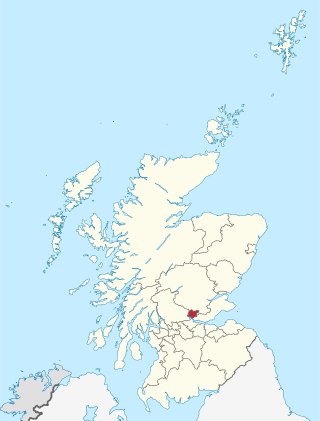
Clackmannanshire, or the County of Clackmannan, is a historic county, council area, registration county and lieutenancy area in Scotland, bordering the council areas of Stirling, Fife, and Perth and Kinross. In terms of historic counties it borders Perthshire, Stirlingshire and Fife.

Stirlingshire or the County of Stirling is a historic county and registration county of Scotland. Its county town is Stirling.
Grahamston Football Club was a Scottish association football club based in the village of Grahamston, Stirlingshire, now part of Falkirk.
Vale of Bannock Football Club was a Scottish association football club based in the town of Bannockburn, Stirlingshire.
Campsie Football Club was a Scottish association football club based in the village of Lennoxtown, Stirlingshire.

Gairdoch Football Club was a Scottish association football club based in the village of Carronshore, Stirlingshire.
Slamannan Football Club was a Scottish association football club based in the village of Slamannan, Stirlingshire.
Redding Athletic Football Club was a Scottish association football club based in the village of Redding, Stirlingshire.
Kilsyth Wanderers Football Club was a Scottish association football club based in the town of Kilsyth, North Lanarkshire.

Camelon Football Club was a football club from the town of Camelon, Stirlingshire, Scotland. The club twice won the Stirlingshire Cup in the late 19th century but was wound up in 1905.
Tayavalla Football Club was a football club from the town of Camelon, Stirlingshire, Scotland.
The Oban Football Club was a football team based in Oban, Scotland.
Dunipace Football Club was an association football club based in the town of Denny, in Stirlingshire.
Crieff Football Club was a football club from the village of Crieff, Perthshire, Scotland.
Tillicoultry Football Club was a football club based in Tillicoultry, Clackmannanshire.
Denny F.C. was a football club from Denny, Stirlingshire.
Townhill F.C. was an association football club from the village of Townhill, Fife, which played in the Scottish Cup twice in the 19th century.
Smithstone Hibs F.C. was a football club from Kilsyth in Scotland.
Campsie Hibernians Football Club was a Scottish association football club based in the village of Lennoxtown, Stirlingshire.
Southfield Rangers Football Club was a Scottish association football club based in the village of Slamannan, Stirlingshire.




